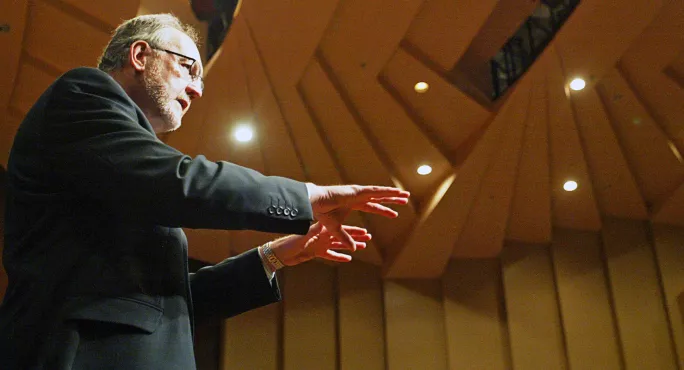Michael Fullan: For reform to succeed, ‘turn the system on its head’

The Canadian educationalist and former adviser to Tony Blair, Michael Fullan, has delivered a potentially unnerving but unquestionably timely message to Scottish education directors at their annual conference.
Scottish education is in the midst of a major reform programme, led by the Scottish government. However, Fullan, who addressed the ADES conference remotely from his home in Toronto, said top-down reform led by politicians cannot work because - irrespective of their beliefs or personality - they cannot “possibly grasp the complexities of what’s going on at the local or near-local level” and governments “don’t last long enough to complete the task”.
His advice was to “ignore the top until you are noticed for the good things you are doing” and politicians are willing to work “in true partnership”.
‘There are ways of doing this assignment better’
Fullan, former dean of the Ontario Institute for Studies in Education and professor emeritus of the University of Toronto, said: “The top doesn’t really know why policies don’t work because they don’t study that part and therefore they don’t get better.
“I’m not really blaming the top - I think they’ve been handed a bad assignment - but there are ways of doing this assignment better.”
- Background: Education directors criticise ‘watering down’ of reforms
- Related: Isolation and loneliness akin to pandemic, warns education leader
- Long read: What does the quiet reform of Education Scotland mean for the future?
Scotland is going through a wide-ranging reform programme, much set in motion by the failure to properly implement a previous reform - Curriculum for Excellence (CfE).
Exams body the SQA is to be replaced; Education Scotland is to have its inspection function removed and placed in a separate body, with the remainder “refocused”; the first “curriculum-improvement cycle” is underway; and change to qualifications and assessment has been promised.
Much of this is being led at the national level - and although the process got underway in 2021, tangible change is hard to point to.
The level of ambition has also been criticised, with education directors themselves recently suggesting there is a danger change will be “minimal” even though, they argue, Scottish education in the 21st century requires significant change “rather than a surface makeover”.
Into that landscape stepped Fullan - and his view that change led by politicians cannot work, further diluting any lingering hope that things might improve.
However, while he could hardly have been clearer about what does not work, he did present solutions - telling delegates in Cumbernauld yesterday to “turn the system on its head” and shift the centre of gravity to students, teachers, headteachers and communities.
He urged them to “intrigue the top” and work with their schools and communities to bring about change. Teachers did not mind “specificity” but it had to be “specificity without imposition” - in other words, if leaders wanted change to be successful they had to work collaboratively with teachers and ensure they were at the table and involved.
Fullan said there would be “criticism along the way”, but told the education directors to “shrug off the criticism”. Their strength, he said, was their “professional expertise”.
However, it was suggested by one delegate that the power the education secretary has to influence the system in Scotland “is sightly depressing” - with the government’s unilateral decision to end “regional improvement collaboratives” (RICs) cited as an example.
Scotland has ‘more power to mobilise’
Fullan said that politicians come and go and that was “the nature of the beast”. In Scotland, there was more power “to mobilise upwards than in most places”.
Referring to the winding down of RICs, Fullan said: “Don’t allow yourself to be disappointed next time.”
He added: “Ignore the top until you are noticed for the good things you are doing. I do think some of them will get it along the line and we don’t need them until they are willing to be involved in the right way.
“Maybe if you ignore them enough they’ll show an interest in true partnership because the answer to this is partnership - two-way partnership.”
Fullan’s advice chimed with recent evidence to the Scottish Parliament’s Education, Children and Young People Committee on the reform of qualifications and assessment.
At the end of October, the committee heard from secondary heads, who emphasised the need for change. School Leaders Scotland president Peter Bain said: “We are teaching to the test, and have been for 100 years now. We need to stop it.”
But Glasgow’s education director, Douglas Hutchison, told the committee there was nothing to stop councils from looking “at aspects of the [Hayward review of qualifications and assessment]” and beginning “to build a coalition or a consensus around those aspects”.
He said the West Partnership RIC - comprising eight councils in the west of Scotland - was looking to take forward the Hayward review’s proposed the diploma of achievement “or something similar at a local level”.
On CfE, Fullan’s diagnosis was - while stressing he was no expert on Scottish education - that it had “stayed at the abstract level” and that the goal was clear but “the means”, or how to get there, was not.
For the latest in Scottish education delivered directly to your inbox, sign up for Tes’ The Week in Scotland newsletter
Keep reading for just £1 per month
You've reached your limit of free articles this month. Subscribe for £1 per month for three months and get:
- Unlimited access to all Tes magazine content
- Exclusive subscriber-only stories
- Award-winning email newsletters
topics in this article



